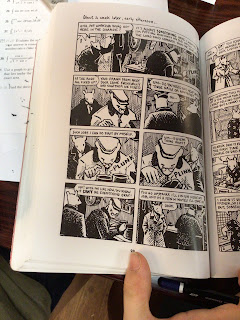Maus Chapter 5 pg. 98 Analysis
In chapter 5, pg. 98 of Maus, Vladek is angry at Artie, who came by to check on him in the garage. Vladek uses invective language to criticize Artie, revealing how his trauma forces him to live within his past. When Artie first strikes up conversation with his father, Vladek responds vaguely, saying, “It’s always SOMETHING here I must do”, showing how Vladek’s mindset keeps himself busy, as opposed to Archie, who chooses to live his live as it goes, never in a rush. While Vladek is yelling at Archie over the phone on pg. 97, shown through the use of jagged speech bubbles, Archie is desperately waiting for Vladek to give up his ranting so that he can go back to sleep. When Vladek finally tells Archie he doesn’t need to come help him anymore, Archie looks happy and says “That’s great!”, as he isn’t the type to look for work like his father. Vladek’s unusually angry tone shows how he can’t accept living a peaceful life — everything must be work for him. Thus, it can be concluded that Vladek has a necessity to constantly live life on edge. The choice of the word “SOMETHING” in bold proves that Vladek may not even understand what he needs to do nor whether it truly has urgency, but that he still holds it in with importance. Look to where Archie asks his father, “is everything okay?”. Vladek begrudgingly responds, “you know it CAN’T be everything okay!” As if it were a fact. This shows again Valdek’s mindset that he will never be okay, and his life can never be fixed after his trauma. That is why not only do we see Vladek “fixing something” during the prologue, which took place in 1958, but we still see Vladek “fixing the drainpipe” a week before this event. Vladek was broken by his trauma in ww2, but his stubborn survivor’s guilt mindset didn’t allow him to recover in the post-war world. When Archie asks if Vladek is okay, Archie is holding a cigarette, with smoke fuming out of it. This is an example of irony, because smoke is a recurring motif and symbol for the gas chambers used in the holocaust. There’s no way Vladek could be okay when experiencing this second-hand smoke, therefore we can see how Vladek can’t escape his past, especially when his avid smoker of a son (the person who he himself created) is constantly reminding him of it. This is another proof of generational trauma — Archie’s mere existence is triggering to Vladek. Another sign of Vladek and Archie’s strained relationship is that Archie isn’t wearing the coat that Vladek gifted him prior. Vladek is wearing a similar coat, but Archie is wearing one similar to the one Vladek threw out. This rift between Archie and Vladek shows the differences between them, and emphasizes that Vladek can’t become a normal person. Also, the walls in the garage are portrayed with — you guessed it — stripes. This inadvertently shows how Vladek surrounds himself with the memories of what hurt him — the holocaust, the uniforms he wore, being imprisoned. And while he tries to fix “things” in the garage, he is always reminded of his past, and how he can’t escape it. That’s why, although usually the present is displayed with open picture, pg. 98 has only closed boxes. It shows how Vladek, in the garage, is trapped in his past, trying desperately to fix it but never coming to terms with it, even after 15 years (the prologue). The despair of Vladek’s situation is much like the story of Sisyphus. The more Vladek tries to repair the past, the more he falls deeper into it. Deeper into a deep hole, a circle, if you will. A circle just like the Nazi’s — Vladek’s downward spiral which he can’t escape shows the everlasting trauma he has and the control the Nazi’s have on him even in present day.

I like how you said that Archie’s mere existence is a trigger to Vladek. All the evidence you complied says so as well, but I specifically liked how you arrived to that conclusion. I also like how you pointed out the boxed text while Vladek was in the garage, showing how he is trapped in the past. Very deep thinking.
ReplyDelete